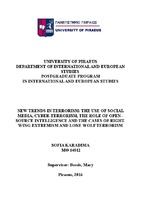| dc.description.abstractEN | Terrorism has existed almost as long as humanity, and has appeared in various
forms, creating new and evolving trends, making the definition of terrorism even
more difficult to define. The purpose of this thesis is to examine the new trends in
terrorism after the terrorist attacks of 9/11, as well as attempting to find the factors
that facilitate the emergence and/or recurrence of trends in terrorism, by examining
the related Literature, creating case studies and providing supporting evidence from
material composed by the terrorist organizations, such as the electronic magazines
of ISIS and al-Qaeda. The thesis, at first provides a theoretical framework, that aims
to assist in the comprehension of the trends in terrorism under examination. The
trends examined seem to have a common thread, technology. At first, the use of
social media by terrorists. Terrorists rely on media to pass their message and
demands, as well as to attract members and donations, Presently, social media
provide a unique opportunity for terrorists to spread their propaganda message
and material, radicalize, recruit, and obtain funding, without relying on traditional
media to do so. Moreover, terrorists organizations using online capabilities and
social media are increasing and becoming more sophisticated, such as in the case of
al-Qaeda, ISIS, Boko Haram and al-Shabaab, whose (social) media themes, activities
and other significant information regarding their actions are presented as case
studies. Also, cyber-terrorism, is examined as it is often being referred to and
thought to be a trend, even though there seems to be no proof of its occurrence yet,
despite the technological advancements and cyber-related skills of terrorists.
Moreover, the role of Open-source Intelligence is examined since open sources, could
be extremely helpful for states and Intelligence agencies, in the fight against
terrorism as well as for terrorists which could freely utilize the often, sensitive
information provided in open sources to their advantage. In addition, right-wing
extremism, which also takes various forms and although may not be a new trend,
seems to be rising, claiming to be reacting to what they perceive as unjust and to be
against their beliefs, yet also by causing injustices and brutalities, and also use
cyber-based capabilities. Moreover, lone wolf terrorism, is also examined as being
a trend, since it is widely used by governments and media, however, it presents
certain flaws, and it is too neither clearly defined, nor widely accepted as a term and
concept. Lastly, Andrers Behring Breivik, is examined as a case study, since his
actions, are considered to be right-wing and of counter-jihad ideology and is
considered an example of a lone wolf. The thesis comes to the conclusions that not
all considered trends are indeed so in reality, however some factors that facilitate
trends in terrorism are strategies, methods and tactics, that have been successful in
the past, the adaptability terrorist when faced with changes and hurdles. Also,
competitiveness between terrorist organizations may cause them to find more
innovative approaches to stand out and attract more recruits, donations and media
attention, and also technology is a significant factor, since cyberspace has become an
important area for terrorist activities, even if they have not fully explored its
potential. | el |



